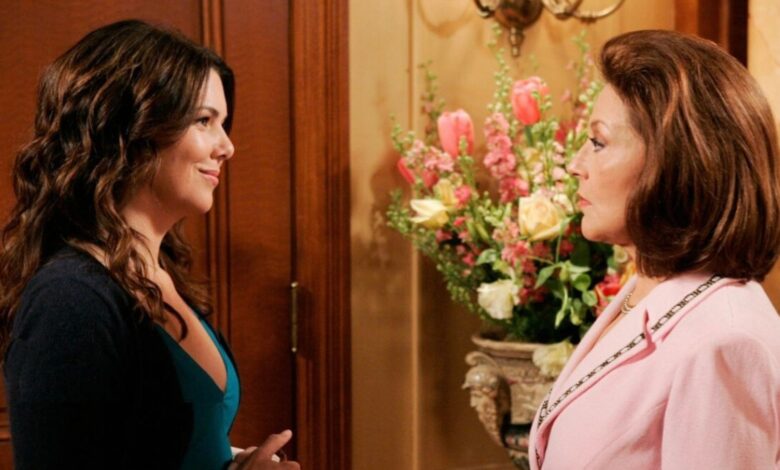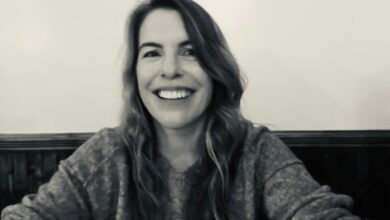


Two decades ago, on a blistering winter night, I turned on the television and found something I’d never encountered before: A mother and daughter who teased each other like sisters. Who shared confidences like friends. Who accepted each other for who they were, rather than viewing their differences as faults.
I’m talking, of course, about Gilmore Girls.
“Mother” and “daughter.” Those words meant something very different to me than it did to Lorelai and Rory. Because, you see, my own mother bore a remarkable resemblance to Lorelai’s mother, Emily. My mother had Emily’s enormous dark eyes and impossibly high cheekbones, her helmet of hair and love of department stores. Emily’s pleated trousers and tailored blouses and St. John suits could have been filched from my mother’s closet.
But, most important, my mom shared Emily’s sharply defined expectations for her children and her coolly rigid idea of appropriate behavior, dress, grooming, and vocation. Acceptable dinner conversation: school, work, travel plans. Acceptable fabrics: cashmere, wool, silk. Once, as a small child, I suggested to my mother that we go camping; “Animals sleep outside,” she responded. “People sleep in hotels.” When I was in eleventh grade, my mother suggested I drop my best friend because she wore a translucent skirt without a slip.
In short, the world from which Lorelai sought escape could have been my own — a world centered on societal rules that allowed no room for even a smidge of sentiment.
Midway through that first season, I burst into gulping sobs when Emily tells Lorelai, “You always let your emotions get in the way. That’s the problem with you, Lorelai. You don’t think.” This was, to a tee, my mother’s problem with me. “Mom, please,” Lorelai says, gently, begging, for her mother to try to see things from her point of view, or to allow her to fall in love, or to be disappointed, or sad, or excited; to see that decisions can be made based on emotional inclinations rather than societal expectations. I had uttered those exact words, too. Though not for some time. I had — just as Lorelai before the show starts — given up on my mother.
That same year, I made some radical changes to my life, as a 28-year-old New Yorker: I stopped going to dinner parties simply because it was expected of me, and I began to consider both my ambition and my storm-like emotions as assets, rather than flaws. I started to think, too, about what it meant to be a mother. I had been married for two years and had deflected the pressure — from my husband, my parents, the world — to have children, in part because I felt like a kid myself, still in the thrall of my mother’s judgements, and also because I didn’t understand how to be a mother unlike my own.
But, suddenly, I saw that a different style of motherhood was possible: Lorelai was a parent who allowed her child to be her true self, who responded with warmth, who kept her sense of humor, even in the hardest moments.
Seven years later, I watched the final season of Gilmore Girls as my first child slept in his toddler bed. A year later, my daughter arrived, and I re-watched the entire series, from beginning to end, sometimes with her asleep in my arms, reminding myself of the mother I wanted to be.
Years passed and my kids grew into Rory-like teens: precocious readers and writers, hilarious companions, compassionate friends. One evening, as we sat on our big shabby couch — not unlike Lorelai’s big shabby couch — I had the rare thought that I had succeeded; I had forged a different style of motherhood than the one with which I had been raised.
This was followed by a second thought: My kids were old enough to watch Gilmore Girls.
And so we began, the kids laughing at the similarities between Lorelai and me — a coffee-swiller who quoted old movies — and my mother and Emily. But as we watched, a strange thing happened: I found myself sympathizing with Emily.
Now that I had teens of my own, I saw Emily as a tragic figure, a woman who had given her daughter everything — including the full force of her energy and love — only to have that daughter, at 16, cut her off completely. My son Coleman was 16. Like Emily, I had poured my everything into him. If he absconded in the night, refusing to speak to me, I wasn’t sure I would survive. And suddenly, the weight of my own mother’s sorrow hit me. She had raised me to be a part of her life, and I had rejected that life, wholesale. How had she survived?
Emily, I realized, was not a monster of superficiality, but a woman eviscerated by loss. Before me, my mother had already lost two children — my older brother and sister were killed in a car accident before my birth. Maybe she was not the villain I’d always believed her to be, but a mother awash in grief, afraid to give herself over to a child — me — who might leave her, too.
During those weeks, I ached to run to my mother, to tell her how sorry I was, that I knew she loved me, that I understood that her tightly held code must have kept her sane and functioning.
Not long afterward, my mother — at 93 — landed in the hospital with viral pneumonia, and soon was transferred, unconscious, to hospice. As I sat by her bed, stroking her hair, I thought about the Mom, Please episode, which ends with Rory coming home to find Lorelai in bed, fully dressed, rigid with grief. Without a word, Rory climbs in next to her. I had never seen my mother cry. She had never let me see the self behind the perfectly applied Chanel Rouge Gabrielle. Or maybe I had not tried hard enough to break past her façade. Maybe I had not said mom, please often or hard enough.
Now, holding my mother’s hand, swollen from the painkillers dripping into her arm, all the anger I’d held for her vanished. All I wanted was my mother back — not a Lorelai version, who’d allow me access to her soul, but my actual mother.
And so I talked. And talked and talked. I reminisced about the fun we’d had on our family trips to California and Florida, about movies she loved and books she hated, about the garden she’d tended outside my childhood home. I asked her all the questions I’d never been able to ask. As I talked, her face moved in response, her mouth forming silent words, when I said, “I love you, Mom.”
“Do you think you and Grandma will ever be able to talk about all the things you’ve gone through?” Rory asks Lorelai, in an early episode. “No,” Lorelai tells her. “I’ve tried. I’ve tried my whole life. But my mother and I, we speak a different language.” At first, I thought Gilmore Girls changed my life because it allowed me to be my actual self, without shame. Years later, I thought it changed my life by showing me how to be a mother. Nearly a quarter century since I turned on the TV and discovered two women talking and talking, it changed my life again, by showing me that — as Lorelai slowly discovers herself — my mother and I spoke not different languages but simply variant dialects of the same tongue: love.
A longer version of this essay appears in Life’s Short, Talk Fast: Fifteen Writers on Why We Can’t Stop Watching Gilmore Girls, an anthology of essays that comes out this week.
Joanna Rakoff is the author of the bestsellers My Salinger Year and A Fortunate Age. Her memoir, The Fifth Passenger, will be out next year. You can watch the film adaptation of My Salinger Year, and you can find Joanna on Instagram.
P.S. Three women describe their complicated mother/daughter relationships, and what it’s like to raise children in different countries.




